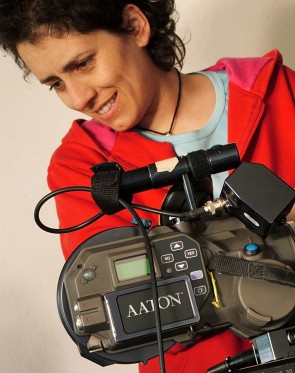
Albertina Carri
Films in our catalogue
Biography
Née à Buenos Aires en avril 1973, la réalisatrice et scénariste fit ses études à l'Université du cinéma, puis se perfectionna dans la direction d'acteurs et dans la mise en scène. Elle enrichit sa formation en travaillant à la direction photo sur des films de célèbres réalisateurs comme Maria Luisa Bemberg, Lita Stantic ainsi que ses contemporains Martin Rejtman et Gaspar Noé. En 2000, Carri reçut la subvention de la Fondation Antorchas qu'elle utilisa pour expérimenter différentes techniques d'animation, et, en résultèrent les courts-métrages Aurora et Barbie tambien puede estar triste, primés dans différents festivals. L'impact audiovisuel du porno fait avec des poupées, croisé avec le mélodrame classique a transformé Barbie...en objet culte. A 24 ans, elle tourna un opéra en Noir et Blanc, No Quiero volver a casa, qui participa aux festivals de Buenos Aires, Rotterdam, Londres et Vienne. Internationalement reconnue pour son deuxième long-métrage Los Rubios, réalisé grâce à une bourse du Fonds National des Arts, Albertina Carri obtint de nombreux prix aux V BAFICI, au festival du cinéma latino-américain de Buenos Aires, fut désignée Meilleur Nouveau Réalisateur au festival de cinéma de Las Palmas et le film reçut le prix du Meilleur Long Métrage au festival de cinéma indépendant L'Alternative de Barcelone. Les Premières commerciales à New York, San Francisco, Chicago et Madrid reçurent d'excellentes critiques, et le film participa aux festivals de Locarno, Toronto, Londres, Gijon, Rotterdam et Gotteborg. Ce qui se dégagea du film fut surtout l'audace du schéma narratif entre le documentaire, le journal intime et la fiction. Pendant qu'elle prépare la production de ses longs métrages, Albertina Carri participe à différents forums internationaux sur le Cinéma, la Mémoire, la Politique et la Fiction étant donné que, depuis Los Rubios, elle est devenue une référence incontournable sur ces sujets.
Albertina Carri was born in April 1973 in Buenos Aires where she graduated from the University of Cinema as a director and screenwriter. After her studies, she developed her skills in directing and production, in particular by collaborating with prominent Argentinean directors such as María Luisa Bemberg and Lita Stantic, as well as with directors of her generation, namely Martín Rejtman and Gaspar Noé. With a grant from the Antorchas Foundation, in 2000, she ventured into the techniques of animation. This experience yielded two award-winning short films, Aurora and Barbie también puede estar triste. The audiovisual effect produced by the mix between doll-animated-porn and classic melodrama has made Barbie... a cult film. At age 24, she made her feature film directorial debut with No quiero volver a casa, a black and white film, screened at film festivals in Buenos Aires, Rotterdam, London and Vienna. With her second feature film, Los rubios, financed with a grant from the National Arts Fund (Argentina), Albertina Carri reached international recognition. In Buenos Aires, the film won several awards at the Fifth Annual BAFICI (International Independent Film Festival) and at the Second Annual Latin American Film Festival. She obtained the Best Feature award at the Festival for Independent Cinema of Barcelona (Alternativa) and the Best Director award at the Las Palmas Film Festival in Spain. When released in New York, San Francisco, Chicago and Madrid the film got excellent reviews, and has been screened in festivals throughout the world including Locarno, Toronto, London, Gijón, Rotterdam and Göteborg. Los rubios is appreciated for its daring narrative structure on the borders of documentary style, personal diary and fiction.